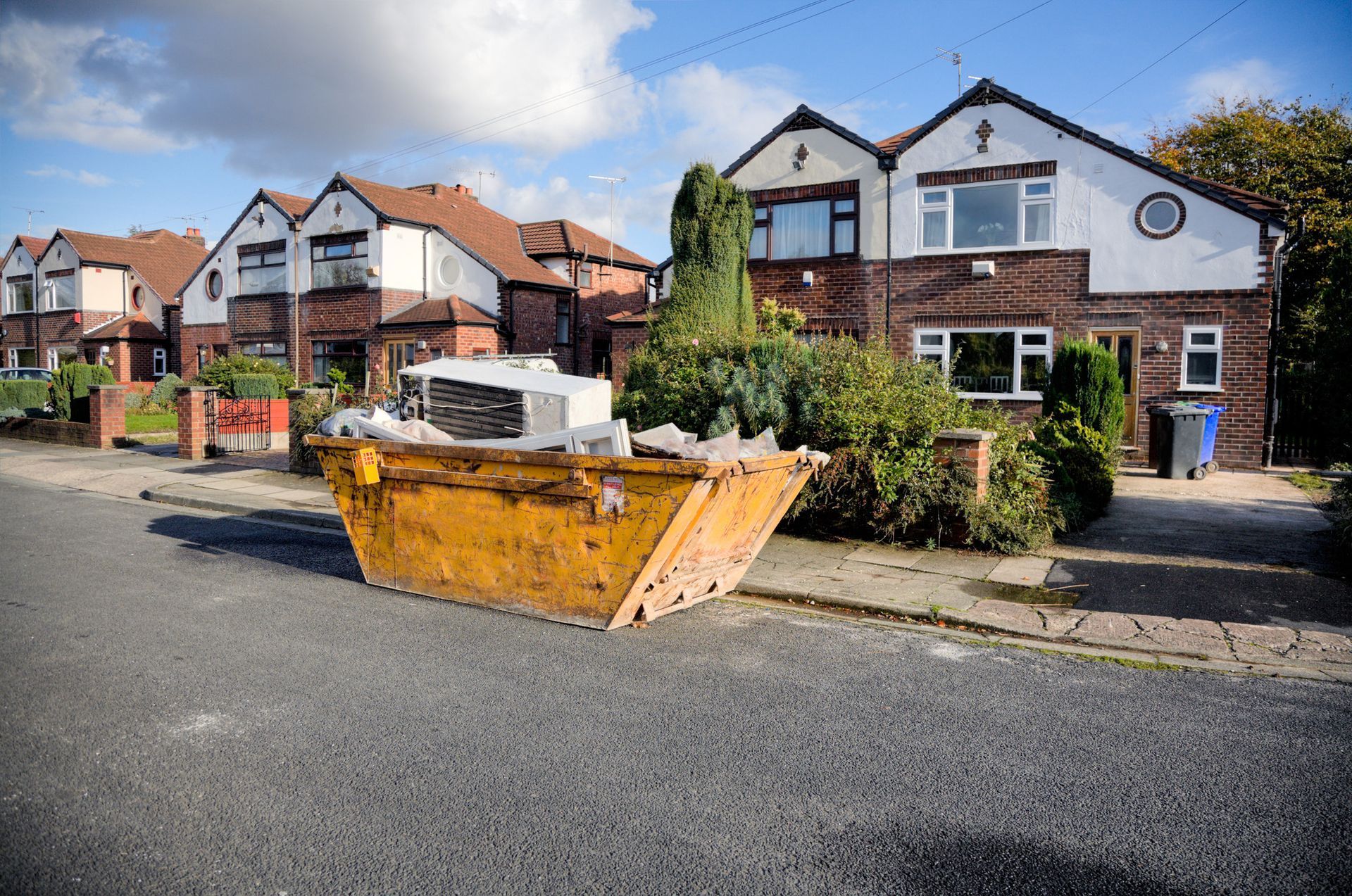The UK Cities Leading the New Year Clear-Out Trend

As the new year begins, many Brits embrace a fresh start – not just for themselves but for their homes too.
From clearing out cluttered cupboards to tackling long-overdue home improvements, the urge to refresh and reset is stronger than ever.
Across the UK, certain cities are leading the charge in this annual home clear-out trend, with a surge in demand for skip hire and removal services.
According to cleaning experts at Flash, Brits will spend over two years of their lives cleaning their homes on weekly chores.
So, which cities are at the forefront of the UK’s annual home refresh?
Yell has broken down the data to reveal the cities leading the new year clear-out trend – alongside expertise from waste removal experts – so that you too can join the trend.
Waste removal searches begin to rise in February
Search trends show an increase in demand for waste removal services from February onwards, as households across the UK begin clearing out accumulated clutter and making room for the year ahead.
Searches for “skip hire” see over 348,000 searches each month and are up 43% in the past month alone.
- Rubbish removal: 42,000 searches each month, up 10% in the past 30 days
- House clearance: 44,000 searches each month, up 35% in the past 30 days
Birmingham leads the UK annual home clear-out trend
It’s revealed that Birmingham is leading the way when it comes to clearing out their homes this new year.
With an impressive 1,600 total searches for skip hire, house clearance, and rubbish removal, this translates to 140 searches per 100,000 people.
With a large population and a thriving mix of homeowners and renters, it’s clear that Brummies are embracing the New Year clear out, clearing out unwanted clutter to start the year fresh.
Below is a list of the top 15 UK towns and cities with the highest number of searches per 100,000 people for the search terms 'skip hire’, ‘rubbish removal’ and ‘house clearance’.
| Ranking | City | Search per 100,000 population |
|---|---|---|
| 1 | Birmingham | 140 |
| 2 | Liverpool | 99 |
| 3 | London | 79 |
| 4 | Bristol | 79 |
| 5 | Leeds | 72 |
| 6 | Edinburgh | 71 |
| 7 | Sheffield | 70 |
| 8 | Newcastle | 56 |
| 9 | Leicester | 49 |
| 10 | Nottingham | 38 |
| 11 | Cardiff | 36 |
| 12 | Manchester | 25 |
| 13 | Glasgow | 23 |
| 14 | Belfast | 20 |
| 15 | Brighton | 17 |
Liverpool and London: the rising decluttering hubs
Coming in second is Liverpool, where residents are particularly keen to declutter, with 99 searches per 100,000 people.
Meanwhile, London, despite having the highest total number of searches (7,020), ranks third when adjusted for population, with 79 searches per 100,000.
With smaller living spaces and a fast-paced lifestyle, it’s no surprise that Londoners are looking for efficient ways to clear out unwanted items.
Expert advice on tackling your January clear-out
The thought of an annual clear-out can feel overwhelming, especially if you have a larger home. However, by breaking it down into simple, manageable steps, you can tackle the task efficiently – without feeling tempted to give up halfway through.
The team at Yell has partnered with Tom Broomfield, Waste Commercial Manager at Smiths (Gloucester) Ltd. who has provided recommendations for when you have larger amounts of clutter to throw out and tips for starting your new year clear-out.
1. Start with a plan
Decluttering can feel overwhelming, so break it down into manageable steps. Instead of tackling your entire home at once, focus on one room or category at a time (e.g. clothes, toys, kitchen items).
Setting realistic goals will keep you motivated and prevent burnout. If you think you may have a considerable amount to throw away, it’s worth considering hiring a skip, but this requires some planning.
Hiring a skip for the first time can feel like a big task, but with a little preparation, it’s a smooth and straightforward process. Tom shares some essential points to consider before booking:
- Space: do you have enough room on your driveway for the skip? If not, it may need to go on the road, and we’ll need to obtain a road license for this, so extra time is required before delivery
- What are you disposing of? Different skips are designed for different types of waste. Is it mixed general waste, or do you have a specific waste stream like garden waste or building materials?
- Always check the skip providers list of non-permitted items on their website. You’ll need to let them know if you have any of these, as they’ll need to be removed before they can take your waste
- Access to your home – is it suitable for HGV access? Ensure there’s enough space for delivery vehicles to reach your property and safely drop off the skip
Taking these points into account ensures a hassle-free skip-hire experience, leaving you with more time to focus on your home clear-out.
2. Sort smartly: keep, donate, recycle
If you haven’t used or worn something in the past year, it’s time to let it go. Be honest with yourself – if it doesn’t serve a purpose or bring you joy, it’s just taking up space. Donate, sell, or recycle items rather than letting them gather dust. Create three clear categories for everything you go through:
- Keep – items you use regularly or truly love
- Donate / sell – good-condition items that someone else could benefit from
- Recycle / dispose – broken, outdated, or unusable items that need to go
Disposing of unwanted items can feel confusing, especially when it comes to choosing the right waste removal service.
However, as Tom explains, it all depends on the type and amount of waste you need to clear.
“If you're dealing with everyday household rubbish, a wheelie bin is the easiest and most efficient option. For a bigger home or garden clear-out, hiring a skip gives you the flexibility to dispose of large amounts of waste.
“If you have a single bulky item, like an old fridge or other hazardous waste, a one-off van collection is the most convenient solution. And for those tackling major renovation projects or large volumes of building waste, a tipper lorry or grab lorry ensures everything is removed quickly and efficiently.”
By selecting the right service, you can streamline your clear-out, save time, and make waste disposal effortless, ensuring your home or project stays clutter-free with minimal hassle.
3. Make use of skip hire & waste removal services
For larger decluttering projects – like garages, lofts, or full home renovations – skip hire and waste removal services can save you time and hassle.
With searches for these services beginning to rise in February, booking early ensures you stay ahead of the demand.
Planning is key when booking a skip, especially during busy periods like spring cleaning or the New Year clear-out.
Tom advises, “We provide same-day delivery where possible, and if not, next-day service. We understand that people like to get organised, so we also take bookings up to a year in advance while still offering the flexibility of last-minute delivery.”
Prices for rubbish removal vary widely depending on the type and volume of waste, as well as the service you choose.
In the UK, you can expect to pay between £75 and £595+ for rubbish removal services or opt for other methods like skip hire or a man and van service.
- Rubbish removal per project: £75 to £595+, average £335
- Man and van (per hour): £60 to £100+, average £80
- Skip hire (per week): £60 to £800+, average £430
- Individual items (e.g. fridge freezers): £15 to £100+
4. Commit to maintenance
Once your home is decluttered, set small habits to keep it that way – such as the “one in, one out” rule (when you buy something new, remove an old item).
Regular mini-clear-outs prevent clutter from creeping back in.
The start of the new year is the perfect time to reset your space and set the tone for a clutter-free year.
Whether you’re clearing out the loft, organising your wardrobe, or tackling a full home refresh, these expert tips will help you declutter with purpose and ease.
When it comes to skip hire and rubbish removal, finding a reliable and trustworthy service provider is essential.
Whether you're tackling a home renovation, a garden clear-out, or simply decluttering, choosing the right company ensures a hassle-free experience and responsible waste disposal.
Yell is the UK’s leading online directory for local businesses, and can provide you with thousands of listings, customer reviews, and detailed business profiles, making it easy to compare services and find reputable professionals in your area.
About Yell
Yell Ltd exists to connect businesses and consumers via its leading marketplace for local services and offering managed digital marketing helping businesses to find, connect and sell to consumers online. Yell Ltd is a proud Google Premier Partner, Microsoft Advertising Elite Channel Partner, and Meta Business Partner.
Learn more at https://business.yell.com and our Media Centre
Visit our social media channels: Facebook, Twitter, LinkedIn, Instagram
Download the free Yell consumer app from the App Store or Google Play
Download the free Yell for Business app from the App Store or Google Play
For media enquiries, please email: press.enquiries@yell.com







